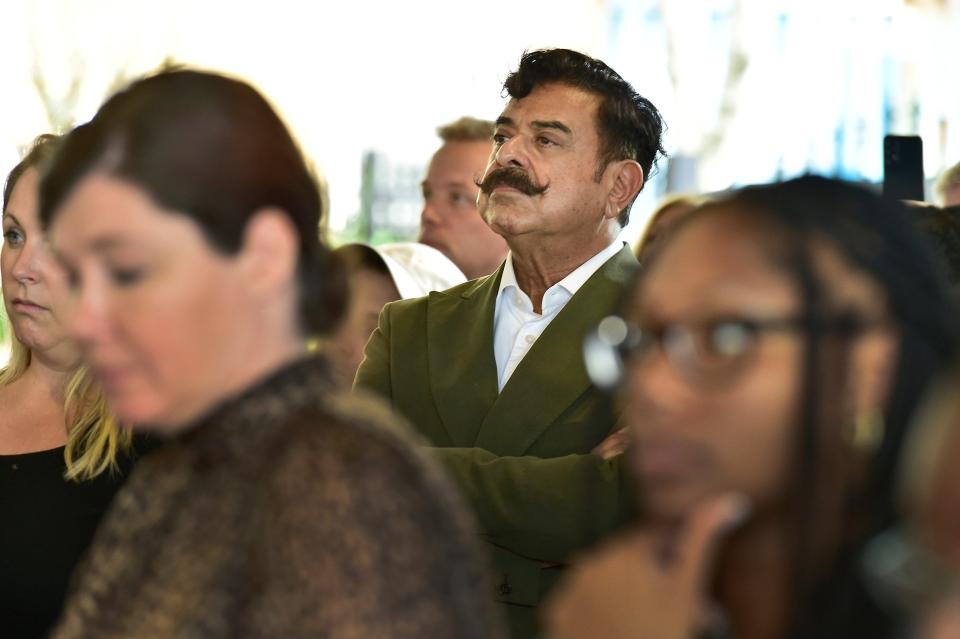Nate Monroe: Jaguars stadium deal is no love story between Jacksonville and Shad Khan

COMMENTARY | The conspicuous absence this week of Jacksonville Jaguars owner Shad Khan as his representatives and city officials rolled out a proposed $1.4 billion stadium renovation deal — their most important accord in the nearly three decades since the Jaguars arrived here, and potentially one of the most expensive infrastructure projects in the city's history — is ... well, typical.
Khan's aloofness and chronic absenteeism have become defining hallmarks of his 12 long years as team owner, and they've often contributed to a sense of uncertainty about his true intentions. What is Khan's end game? For a city with an acute case of imposter syndrome, Khan's dim view of Jacksonville, which he's expressed in various forums over the years, and his clear fondness for cosmopolitan megacities like London and Toronto, as well as the Midwest, which is the home of his car-bumper empire, have been sources of a sometimes palpable foreboding.
Theoretically, the deal between the city and Jaguars on revamping EverBank Stadium should put an end to that. Mayor Donna Deegan's administration negotiated a deal that would obligate the city to pay about $775 million, or 55 percent of the total cost, of the $1.4 billion renovation plan, and in return the Jaguars would commit to a 30-year lease extension. A "non-relocation agreement" is supposed to be part of that extension, though details on the potential penalties aren't yet clear.
Mark Woods: A good deal with a big asterisk — by today's stadium deal standards
Nate Monroe: The promises, contradictions and perils of Jaguars stadium agreement
Gene Frenette: Optics of Jaguars' stadium renovation agreement with city fair for both sides
That the city's share of the costs came in below expectations — a previous term sheet the Jaguars floated last year showed the city putting in nearly $1 billion — was a welcome development and showed awareness by Khan's team that the city is not a limitless supply of free money. But that can obscure an important reality about this financial arrangement: $775 million from the city is an enormous sum that will cause future financial strain of a kind that Khan, responsible for $625 million and entitled to the generational profits of an NFL owner, will not experience himself.
"Could be worse" is neither a favor done for Jacksonville's benefit nor an indication that this project won't weigh heavily on the city's ledger. This is a big lift, and Khan will be the prime and most direct beneficiary.
Early on in his ownership, there were high hopes Khan was a kind of white knight, a mega-investor who could singlehandedly start to move the needle on revitalizing the city's stagnant downtown. Would Khan be Jacksonville's Jeff Vinik, the Tampa Bay Lightning owner who, along with Bill Gates, electrified progress in Tampa's downtown, which was once not so different than our own?
He has not been that kind of investor, though a potent mythology nonetheless still insists that he is. Since those early days, during which Khan did invest in some local interests that ultimately fizzled out, he has retreated to the sports district east of downtown. His interests are now concentrated in developments immediately adjacent to the stadium, and he's tended to insist upon aggressive asks of taxpayers to subsidize his projects. That tendency of Khan's was the source of the most perilous moment in the relationship between Jacksonville and the Jaguars: As the COVID-19 pandemic was still raging, his team insisted on Jacksonville taxpayers injecting more than $200 million in cash into a development he had planned on one of the parking lots next to the stadium, a deal the City Council rejected. It was too much, too unsavory a cash grab.
If nothing else, the long-sought stadium deal, the core of which is likely to win easy approval with the 19-member City Council, offers the city a chance to reset its relationship with Khan and reassess the mythology around him.
Once it's signed, that weighty stadium agreement will be the sum total of Khan's relationship with this city. His aloofness, his absenteeism, the general dismissiveness he seems to exude about the place — those things are unlikely to change, and that's fine. This is business, and it's a business transaction; Khan doesn't need to love his business partner, nor does his partner need to love him. The man whose favor Jacksonville seems to crave simply has other, more attractive suitors. Fair enough.
But Jacksonville earned the Jaguars long before Khan arrived, and Jacksonville made the Jaguars, not the other way around. The costs of this stadium deal — which Jacksonville, unlike other NFL markets, is shouldering without help from state coffers — is nothing if not a potent display of its worthiness to keep that team for another 30 years. And now, even Shad Khan can't deny that.
Nate Monroe is a metro columnist whose work regularly appears every Thursday and Sunday. Follow him on Twitter @NateMonroeTU.
This article originally appeared on Florida Times-Union: Nate Monroe: Jaguars stadium deal is no love story between Jacksonville and Shad Khan


